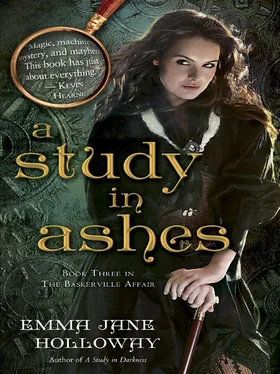They followed him into the private room and he closed the door, standing against it. Watson thought, for a fleeting moment, just how young the Schoolmaster looked, but then he seemed to recover.
“My business in Bath went precisely as planned,” said the Schoolmaster.
“I’m relieved to hear it,” said Holmes. “How can we assist you now?”
A variety of emotions flickered across the man’s face. “I’m about to begin an undertaking, for good or ill, that in some measure will figure in history. I would do so with as little doubt as it is humanly possible to achieve.”
“Doubt about your cause?” Watson asked, concerned.
“No.” The Schoolmaster gave a wry smile. “Not that. But there have been casualties I would lay to rest.”
“Ah,” said Holmes.
“Ah?” Watson was skilled at interpreting Holmesian monosyllables, but this one eluded him.
The Schoolmaster waved toward the table and chairs. “First, I must ask. Are you any closer to solving Sir Charles’s death?”
Watson sat down opposite the Schoolmaster, Holmes at the head of the table.
“Yes, at least in part,” Holmes replied. “As you know, there was every sign that his heart had failed due to an extreme fright.”
“Which the good doctor has attributed in his official account to a family curse in the form of a giant hound,” the Schoolmaster replied dryly. “How enormously Gothic.”
“In any event,” Holmes went on, “his death bore marked similarities to two others you have asked me to investigate.”
“Who were they?” Watson asked.
“A year ago we had two individuals in custody at Loch Ness, a Mr. Elias Jones and Mr. Bingham,” the Schoolmaster said. “They both perished before we were quite done extracting information from them.”
Watson blinked, speaking before he could stop himself. “You tortured them?”
The Schoolmaster frowned. “No. That was never our method of operation, but still two healthy men died unexpectedly. At the time we suspected there was a turncoat in our midst, but an exhaustive review of everyone’s quarters, whereabouts, history—none of it turned up a thing.”
“And their deaths were caused by a very particular substance,” Holmes replied. “They were poisoned in a manner that induced heart failure, but I would postulate that the noxious formula also possessed a psychoactive property, as both the prisoners and Sir Charles retained the marks of severe terror above and beyond what one normally sees stamped on the features of such victims.”
“Are you saying that Sir Charles died by the same hand as our prisoners?” The Schoolmaster fell back in his chair, his expression incredulous.
The detective’s face was serious. “I am saying that circumstances point to the fact that at the time of the prisoners’ deaths, someone was in our midst and pursuing his own agenda. Someone who did not desire the prisoners to reveal everything that they knew to us. And someone who then wished to determine what Sir Charles could tell. After all, Sir Charles had all your secrets.”
Dr. Watson followed this exchange carefully, trying to remember Holmes’s account of the bombing at Baker Street and all that followed. “Was there someone in particular who was in both places at the right time?”
“That would not be necessary,” said Holmes. “All that would be required would be someone able to pull the right strings.” Holmes turned to the Schoolmaster. “Do you recall accompanying me to the Blue King’s court when I was searching for my niece?”
“Of course.”
“At that time, King Coal suspected there was a traitor in his establishment. He wanted me to take that case, but circumstances changed and I never pursued it. However, the matter remained in my mind.”
“Are you saying that his turncoat and ours are the same?” asked Watson.
“At the time, I thought it odd that both Jones and Bingham were double agents, playing Blue and Gold off against one another. Even more strange that orders were issuing from the Blue court that were not authorized by King Coal. At first I suspected the hand of my brother, Mycroft, but there were some things that happened I believe he simply would not do. Most significantly, while he might question Sir Charles, he would never kill him.”
The Schoolmaster had that fixed expression so many got when trying to follow one of Holmes’s chains of logic. “So your suspicions lean to a member of the Blue Court?”
“Yes, and for two reasons. One is the nature of the poison used. Sir Charles and the others weren’t given a drug to keep them silent, it was to loosen their tongues.”
Both Watson and the Schoolmaster jerked to attention. “There are drugs that lower inhibitions in that fashion,” Watson said, “but they’re not always reliable.”
“And the most efficacious of those drugs are not available to the honest physician, but …” Holmes trailed off, waving a hand carelessly. “They are excellent for extracting information. The subject remembers nothing of the incident, and if the dosage is correct, they die. Perfect if someone wanted to empty the brains of our two turncoats, and then stop their hearts.”
“And Sir Charles?” Watson asked.
“He already had a weak heart. I do not think he was meant to die, but the strain on him was too much. Either he suffered a recurrence of the psychoactive effects of the drug, or perhaps he did see something that frightened him, as the local rumors would have it. Either way, it was too much.”
“You said there were two reasons you believe the killer is the same,” the Schoolmaster prompted, his expression grim.
“The other is more oblique,” Holmes continued. “I think King Coal made the connection between Edmond Baskerville and the Schoolmaster long ago. One of his key advisors picked up the thread—I believe independently of his master—and deployed his own scoundrels to learn the truth of that and who knows what other secrets of the rebels, the Gold King, and anyone else. We are dealing with a villain intent on building his own empire.”
“A villain who then came after Sir Charles?”
“But only after Mycroft came here first. The Steam Council has been watching my brother for some time. When he visited Sir Charles recently, the unusual break from his routine was noted. And then the killer struck.”
The Schoolmaster’s face had gone pale. “Who? Whose hand did these things?”
“We may never know who delivered the poison to Jones and Bingham, but I am convinced they received their orders from the same gentleman who visited Sir Charles on the twenty-ninth of September. I questioned your housekeeper, Mrs. Barrymore, on the matter of your guardian’s visitors. Sir Charles had an unusually full schedule of late, but it seems he took the time for tea with a professor of Camelin University who was very interested in the local fauna. Butterflies, to be precise.”
The news sent Watson spinning. “Camelin University is where Evelina—”
“Indeed,” snapped Holmes. “And the notion that she has been resident near this individual turns my veins to ice.”
“Who is it?” demanded the Schoolmaster.
“His name is Moriarty, but he goes by the name of Juniper.”
“The Blue King’s man of business?” the Schoolmaster exclaimed.
Holmes’s lip curled into a snarl. “The more I learn about this individual, the more threads there seem to be to his web. We must have a care with this one, gentlemen. He is not the kind we take to trial, because for all the investigation I have done, there is not one scrap of hard evidence.” He slammed his hand on the table. “I can prove nothing.”
The Schoolmaster pulled off his green-tinted glasses. His blue eyes were icy. “I am tired of hearing that we cannot prove such crimes. I’ve heard it all my life as prince and princess died of dubious causes, and court officials wrung their hands and said there was never enough evidence to point to the Steam Council. Perhaps the law as it stands cannot prosecute these wretches, but soon I will be the law. We will catch this Moriarty, and then you can ask him whatever you please.”
Читать дальше








